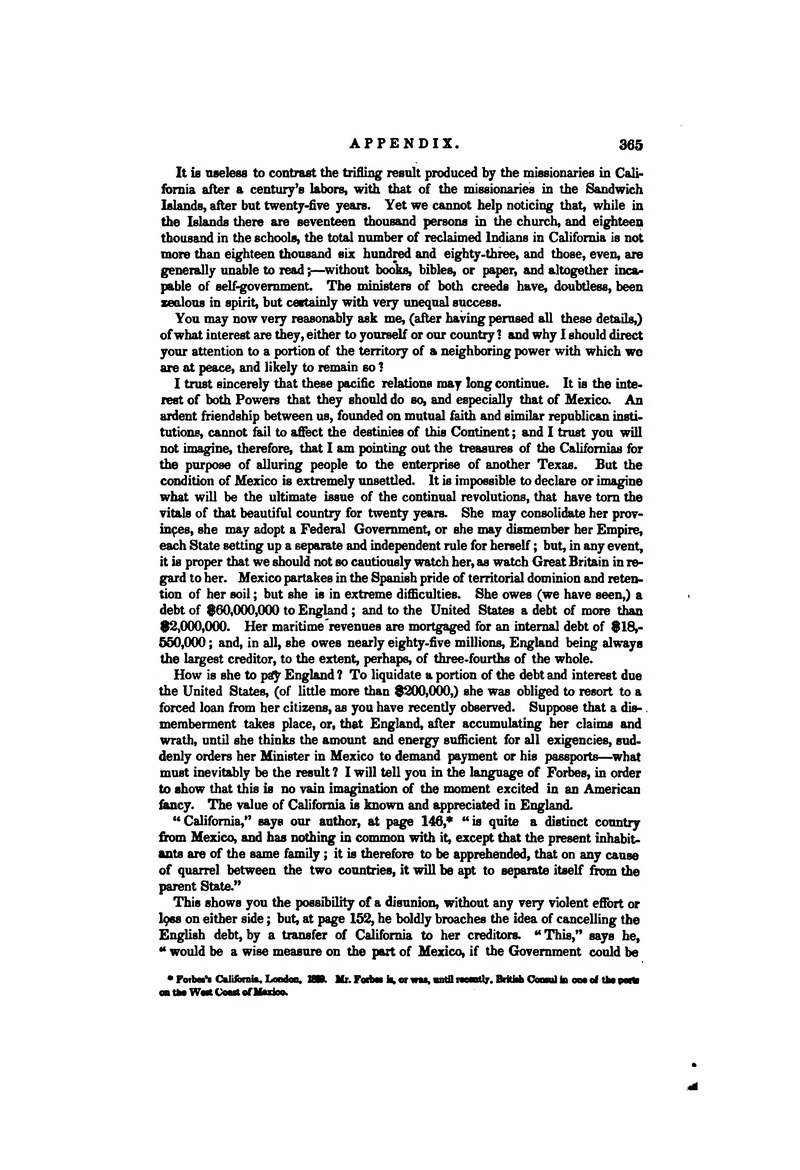It is useless to contrast the trifling result produced by the missionaries in California after a century's labors, with that of the missionaries in the Sandwich Islands, after but twenty-five years. Yet we cannot help noticing that, while in the Islands there are seventeen thousand persons in the church, and eighteen thousand in the schools, the total number of reclaimed Indians in California is not more than eighteen thousand six hundred and eighty-three, and those, even, are generally unable to read;—without books, bibles, or paper, and altogether incapable of self-government. The ministers of both creeds have, doubtless, been zealous in spirit, but certainly with very unequal success.
You may now very reasonably ask me, (after having perused all these details,) of what interest are they, either to yourself or our country? and why I should direct your attention to a portion of the territory of a neighboring power with which we are at peace, and likely to remain so?
I trust sincerely that these pacific relations may long continue. It is the interest of both Powers that they should do so, and especially that of Mexico. An ardent friendship between us, founded on mutual faith and similar republican institutions, cannot fail to affect the destinies of this Continent; and I trust you will not imagine, therefore, that I am pointing out the treasures of the Californias for the purpose of alluring people to the enterprise of another Texas. But the condition of Mexico is extremely unsettled. It is impossible to declare or imagine what will be the ultimate issue of the continual revolutions, that have torn the vitals of that beautiful country for twenty years. She may consolidate her provinces, she may adopt a Federal Government, or she may dismember her Empire, each State setting up a separate and independent rule for herself; but, in any event, it is proper that we should not so cautiously watch her, as watch Great Britain in regard to her. Mexico partakes in the Spanish pride of territorial dominion and retention of her soil; but she is in extreme difficulties. She owes (we have seen,) a debt of $60,000,000 to England; and to the United States a debt of more than $2,000,000. Her maritime revenues are mortgaged for an internal debt of $18,650,000; and, in all, she owes nearly eighty-five millions, England being always the largest creditor, to the extent, perhaps, of three-fourths of the whole.
How is she to pay England? To liquidate a portion of the debt and interest due the United States, (of little more than $200,000,) she was obliged to resort to a forced loan from her citizens, as you have recently observed. Suppose that a dismemberment takes place, or, that England, after accumulating her claims and wrath, until she thinks the amount and energy sufficient for all exigencies, suddenly orders her Minister in Mexico to demand payment or his passports—what must inevitably be the result? I will tell you in the language of Forbes, in order to show that this is no vain imagination of the moment excited in an American fancy. The value of California is known and appreciated in England.
"California," says our author, at page 146,[1] "is quite a distinct country from Mexico, and has nothing in common with it, except that the present inhabitants are of the same family; it is therefore to be apprehended, that on any cause of quarrel between the two countries, it will be apt to separate itself from the parent State."
This shows you the possibility of a disunion, without any very violent effort or loss on either side; but, at page 152, he boldly broaches the idea of cancelling the English debt, by a transfer of California to her creditors. "This," says he, "would be a wise measure on the part of Mexico, if the Government could be
- ↑ Forbes's California. London, 1840. Mr. Forbes is, or was until recently, British Consul in one of the ports of the west coast of Mexico.
